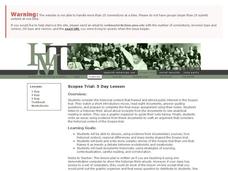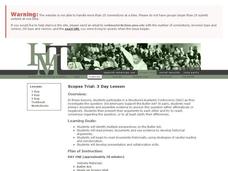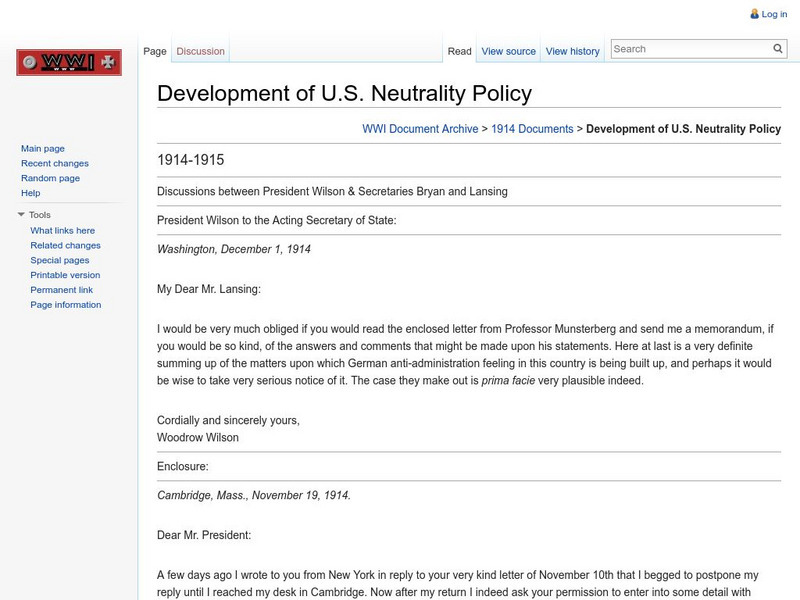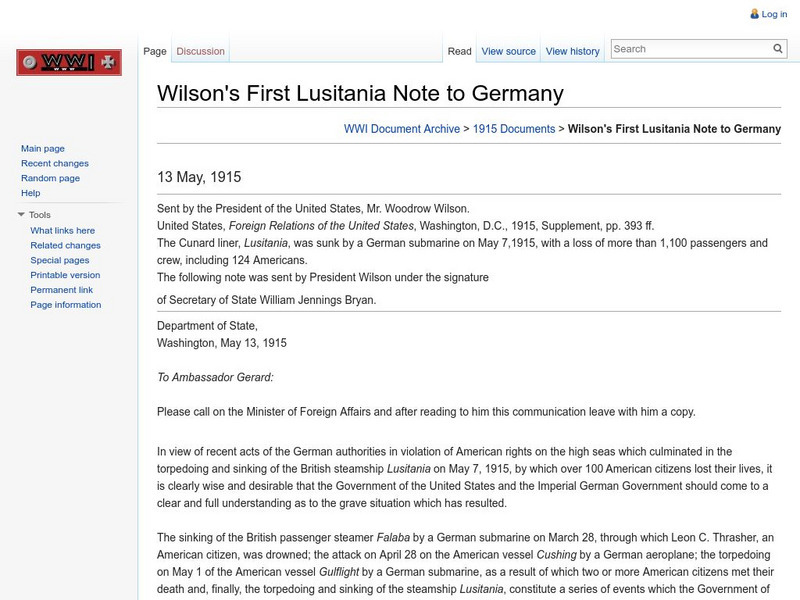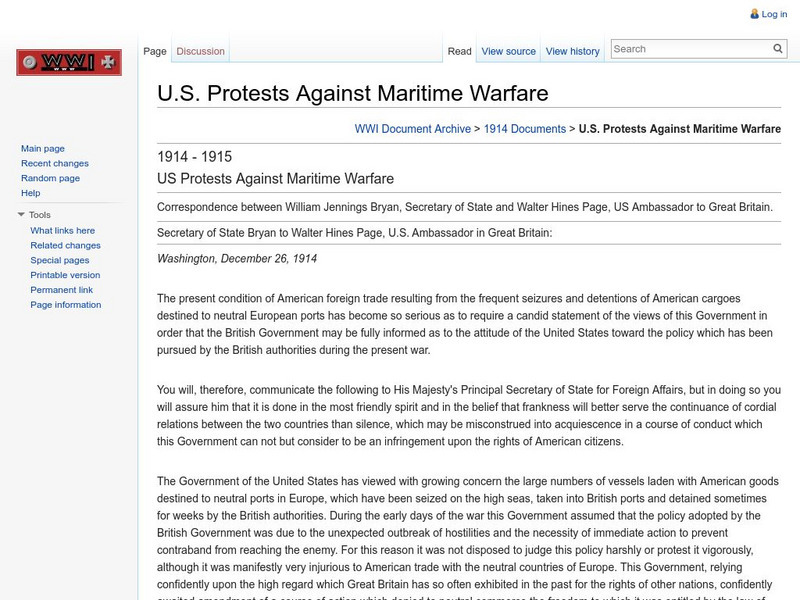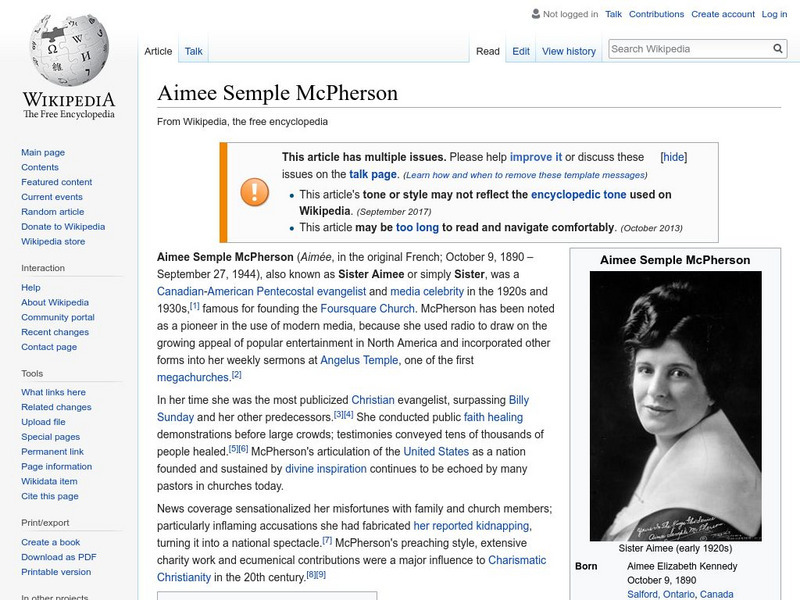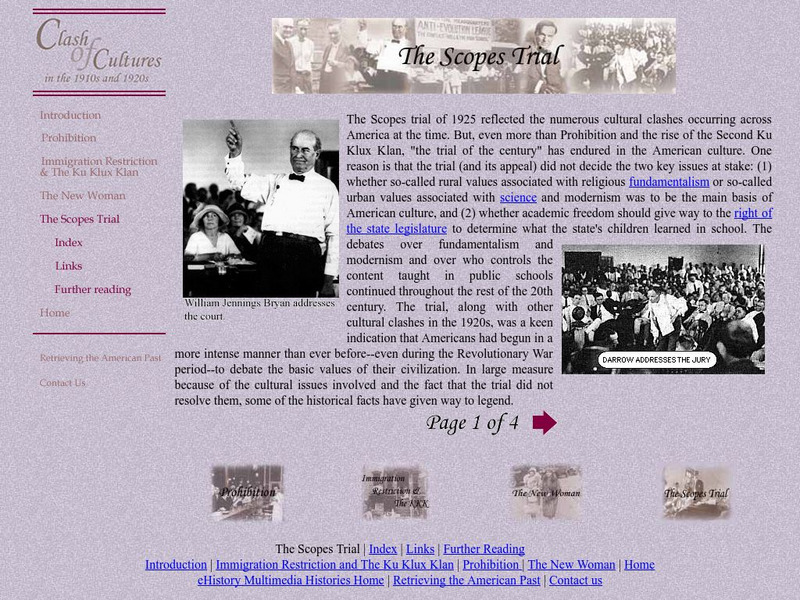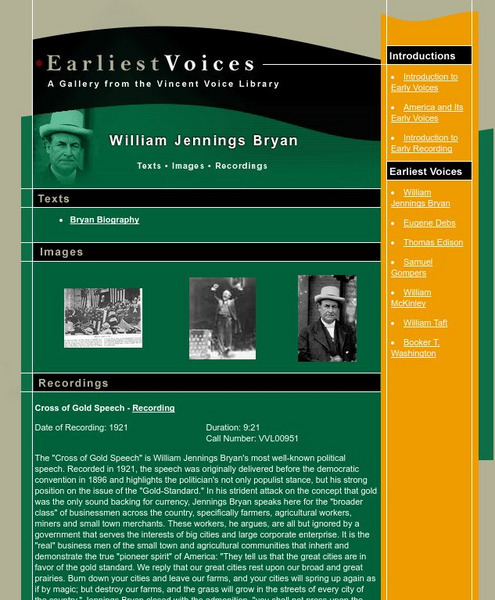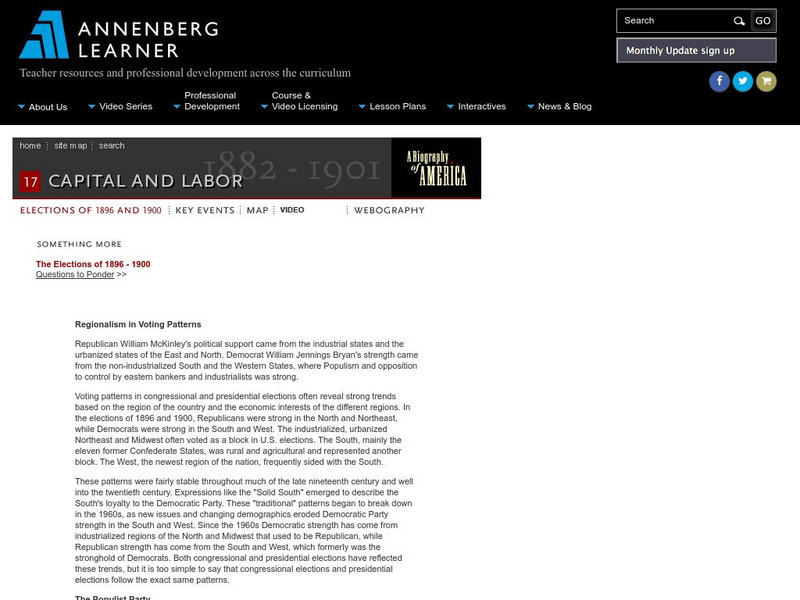Historical Thinking Matters
Scopes Trial: 5 Day Lesson
Did Scopes violate the Butler Act? Why did so many Americans follow the Scopes trial? See analytical reading in action with a fantastic five-day lesson plan in which class members consider the historical context that provoked public...
Historical Thinking Matters
Scopes Trial: 3 Day Lesson
Was the Scopes trial more complicated than a simple debate between evolutionists and creationists? As part of a structured academic controversy (SAC) activity, pupils consider multiple perspectives of the Butler Act and engage in close...
Historical Thinking Matters
Scopes Trial: 1 Day Lesson
Why did many Tennesseeans support the 1925 Butler Act, which forbade the teaching of evolution? Using several primary source documents and a brief video clip, your young historians will draw connections between the broader historical...
Curated OER
History Matters:"pitchfork Ben" Tillman Addresses the 1896 Democratic Convention
Ben Tillman, senator from South Carolina, gave a speech at the Democratic Convention in 1896, advocating for the free coinage of silver, the same issue addressed in a later speech by William Jennings Bryan. Read Tillman's speech here,...
George Mason University
Chnm: Between the Wars: The Scopes Trial
Read the fascinating transcript of the proceedings in court when Clarence Darrow called William Jennings Bryan to the stand to expose the weakness in his argument against evolution in the famous Scopes trial.
University of Groningen
American History: Documents: William J Bryan Cross of Gold Speech July 8, 1896
Read William Jennings Bryan's speech delivered at the Democratic National Convention in 1896; it is considered one of the greatest political speeches in American history.
Brigham Young University
Brigham Young Univ.: Wwi Document Archive: Development of u.s. Neutrality Policy
Correspondence of two Secretaries of State in 1914 and 1915 outlining America's neutrality and the ways it is being demonstrated to countries in Europe.
Brigham Young University
Brigham Young U.: Wwi Document Archive: Wilson's First Lusitania Note to Germany
Read the text of a note sent to the German government by Woodrow Wilson protesting the sinking of the Lusitania.
Brigham Young University
Brigham Young U.: Wwi Document Archive: u.s. Protests Against Maritime Warfare
Series of letters from U.S. Secretary of State William Jennings Bryan protesting British interference with neutral U.S. merchant ships, and a lengthy response from the British government.
Vassar College
Vassar College: 1896: Literary Themes in the Campaign
Take a look at popular literary themes that are reflected in the political cartoons of 1896, the year in which William Jennings Bryant challenged William McKinley for the presidency.
Vassar College
Vassar College: 1896: The Democratic Party
From the very extensive website that covers the presidential campaign of 1896 through political cartoons and contemporary commentary is this discussion about the Democratic Party and its candidates and platform in the election of 1896....
Vassar College
1896: Election Results
The outcome of the popular vote for president in 1896 was close. Read about the electoral votes, see maps showing the popular vote for McKinley and Bryan, and follow the chart that shows the votes for all those running for president....
University of Nebraska
University of Nebraska Lincoln: Railroads and the Making of Modern America
Corruptions, malfeasance, bribery and fraud - all these terms can describe the construction process of the American railroad system. Search primary source documents to uncover the shenanigans that took place in the late 19th century....
PBS
Pbs: The American Experience in the 1900s
This site presents a general picture of what life was like in the United States at the turn of the century. Content includes compelling images, information, and documents about American life.
PBS
Pbs: America 1900: William Jennings Bryan's Campaign Strategy
Historian Walter LaFeber discusses William Jennings Bryan's 1900 campaign strategy to win the White House by criticizing the imperialism of the Republican candidate, William McKinley.
PBS
Pbs: American Experience: William Jennings Bryan "Cross of Gold" Speech
Read the famous Cross of Gold speech given by William Jennings Bryan, Democratic party presidential candidate in 1896. The party platform was against the establishment of the gold standard.
Wikimedia
Wikipedia: Aimee Semple Mc Pherson
Extensive article that explores in great detail the life of Aimee Semple McPherson, fundamentalist evangelist.
Ohio State University
Ehistory: Clash of Cultures in the 1910s and 1920s: The Scopes Trial
Find the index to a larger site about the Scopes trial which has photographs pertinent to the trial, cartoons and diagrams, and essays and excerpts from magazines about the trial. Great primary source material.
Other
Earliest Voices: William Jennings Bryan
This resource features historic voice recordings of William Jennings Bryan. There are recordings of many famous orations by him on various political topics, the most famous being his "Cross of Gold" speech. A biography and downloadable...
Other
Earliest Voices: Gallery From the Vincent Voice Library
This site addresses the advent of the voice recording. The introduction talks about the country at the time of this invention, the feelings of people on the topic, and early recording itself. Included are voice recordings of such...
Smithsonian Institution
Smithsonian Institution Archives: Scopes Monkey Trial
Find previously unpublished photographs of the 1925 Scopes Monkey Trial that were found in the Smithsonian Archives. The photos include captions that explain the context.
Northern Illinois University
Illinois in the Gilded Age: 1896: The Cross of Gold
This is a very informative look at the politics involved in the campaign of 1896 where one of the main issues was the conflict between the gold standard and free silver. Read about the results of the election and the defeat of Populist...
Annenberg Foundation
Annenberg Learner: A Biography of America: The Elections of 1896 1900
Read about all the factions involved in the campaign and election of 1896 and see how the Democratic Party was split, which resulted in the election of Republican William McKinley. The last part of this essay talks about the campaign of...
OpenStax
Open Stax: Great War 1914 1919: American Isolationism and European Origins of War
The foreign policy of Woodrow Wilson is explained, and how he tried to keep America neutral at the start of World War I yet intervened in international affairs in the Western Hemisphere. The reasons America declared war on Germany in...


